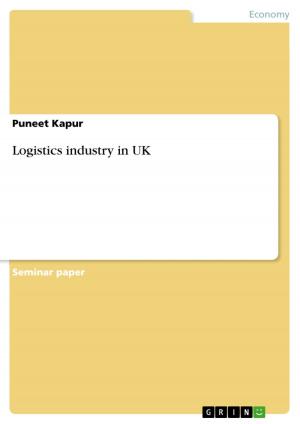A critical comparison of Internationalisation theories: Eclectic Paradigm of Dunning vs. Uppsala School
Business & Finance| Author: | Daniela Margardt | ISBN: | 9783640345922 |
| Publisher: | GRIN Publishing | Publication: | June 12, 2009 |
| Imprint: | GRIN Publishing | Language: | English |
| Author: | Daniela Margardt |
| ISBN: | 9783640345922 |
| Publisher: | GRIN Publishing |
| Publication: | June 12, 2009 |
| Imprint: | GRIN Publishing |
| Language: | English |
Seminar paper from the year 2007 in the subject Business economics - Miscellaneous, grade: 2,0, University of Applied Sciences Saarbrücken, language: English, abstract: 1 Introduction Centuries ago it was out of question for companies to operate worldwide. The costs to act global had been too high as well as the existent lack of knowledge about other countries, cultures, languages, foreign demands etc. But a few decades ago, companies started to run for globalisation which is seen as a process of internationalisation. Globalisation can be defined as a global network of economic processes. Today companies face less risk when engaging in international activities than ever before. Nowadays markets are easy accessible and the society faces a similar development concerning living standards all over the world. Companies notice the existing possibilities when passing national borders. Today internationalisation is an option for big companies as well as for SME´s. Internationalisation can be defined more exactly as the name 'international' predicts as an international network between companies of different nations which means in most cases industrialised nations. Today almost all products and services are internationalised and available on the world market. It is indispensable that enterprises conduct business in host countries to remain competitive. Most companies are aware of internationalisation processes. Multinational companies are enterprises which operate in two or more countries. Bundeszentrale für politische Bildung (1) states that in 1980, approximately 17.000 MNE´s existed. Further Bundeszentrale für politische Bildung (1) explains that already in the year 2000, 63.000 MNE´s existed and in 2004 existed even 70.000 MNE´s. According to Bundeszentrale für politische Bildung (1) belong MNE companies to the countries where their headquarter is based in. Further Bundeszentrale für politische Bildung (1) estimates that approximately 9.000 MNE´s belong to Germany and approximately 2.500 international firms belong to the United States. As it can be observed, the trend in businesses is to become a multinational company. To become a company which engages in international activities is a long time process consisting of various steps. Therefore firms having international intentions began to question under which circumstances they should internationalise its activities and which market entry form they should choose. Methodology Various theories exist which cover that topic for example:... This paper focuses on two approaches which explain firms intention to establish activities outside their national borders...
Seminar paper from the year 2007 in the subject Business economics - Miscellaneous, grade: 2,0, University of Applied Sciences Saarbrücken, language: English, abstract: 1 Introduction Centuries ago it was out of question for companies to operate worldwide. The costs to act global had been too high as well as the existent lack of knowledge about other countries, cultures, languages, foreign demands etc. But a few decades ago, companies started to run for globalisation which is seen as a process of internationalisation. Globalisation can be defined as a global network of economic processes. Today companies face less risk when engaging in international activities than ever before. Nowadays markets are easy accessible and the society faces a similar development concerning living standards all over the world. Companies notice the existing possibilities when passing national borders. Today internationalisation is an option for big companies as well as for SME´s. Internationalisation can be defined more exactly as the name 'international' predicts as an international network between companies of different nations which means in most cases industrialised nations. Today almost all products and services are internationalised and available on the world market. It is indispensable that enterprises conduct business in host countries to remain competitive. Most companies are aware of internationalisation processes. Multinational companies are enterprises which operate in two or more countries. Bundeszentrale für politische Bildung (1) states that in 1980, approximately 17.000 MNE´s existed. Further Bundeszentrale für politische Bildung (1) explains that already in the year 2000, 63.000 MNE´s existed and in 2004 existed even 70.000 MNE´s. According to Bundeszentrale für politische Bildung (1) belong MNE companies to the countries where their headquarter is based in. Further Bundeszentrale für politische Bildung (1) estimates that approximately 9.000 MNE´s belong to Germany and approximately 2.500 international firms belong to the United States. As it can be observed, the trend in businesses is to become a multinational company. To become a company which engages in international activities is a long time process consisting of various steps. Therefore firms having international intentions began to question under which circumstances they should internationalise its activities and which market entry form they should choose. Methodology Various theories exist which cover that topic for example:... This paper focuses on two approaches which explain firms intention to establish activities outside their national borders...















